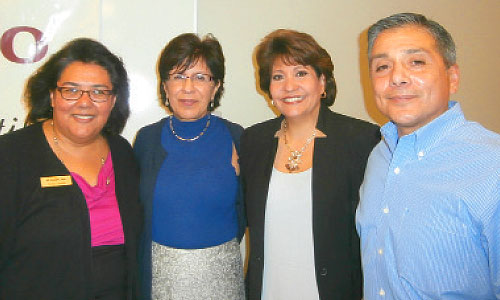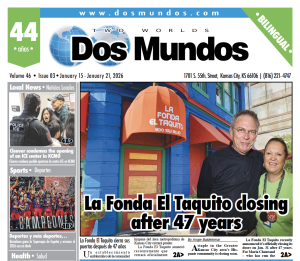
Janet Murguía, Presidenta y CEO del Consejo Nacional de La Raza parece haberse aplacado en su crítica al presidente Obama desde mayo en que apodó al Jefe de Estado “Deportador en Jefe”.
Hablando el 21 de octubre en la sucursal sur de la Biblioteca Pública de Kansas, tras una conferencia animando a los latinos a votar, ella citó conversaciones con el Presidente en las que él había explicado que abordar una economía tambaleantes y una reforma de salud lo habían dejado con poco capital político para hacerse cargo de una reforma migratoria.
Sin embargo, ella señaló un compromiso continuo para mantener al ejecutivo responsable con un electorado latino votante y dedicado.
“Es por eso que todos tenemos que salir y hacer oír nuestra voz”, refirió.
Citando al voto latino que, básicamente le entregó la Casa Blanca el Presidente en el 2008 y los grandes cambios en la política como la Acción Diferida para los Llegados en la Infancia (DACA), Murguía comentó que los hispanos se están involucrando constantemente en contiendas de alto perfil. Pero que la presencia está faltando en las contiendas de mitad de mandato y en las estatales.
“Necesitamos fomentar una cultura de participación”, indicó.
Aunque el bloque de votantes latinos ha y seguirá mostrando un crecimiento dramático — Murguía citó estudios demográficos en su discurso que muestran que alrededor de un millón de latinos tendrán la edad para votar en el 2028 — Louis Ruiz, Representante estatal de Kansas por el Distrito 31, dijo que ese crecimiento necesita ir acompañado de la representación.
Al preguntarle sobre cómo los latinos han cambiado el panorama político estatal en los 10 años que ha estado en el cargo, Ruiz contestó: “No mucho”.
“Mira a tu alrededor en la legislatura”, refirió. “Necesitamos gente que de un paso adelante y ponga su nombre en la boleta electoral”.
Ya sea por apatía o pesimismo, o ambos, las clase política no refleja al electorado ni la sociedad en general, argumentó; y agregó que eso necesita cambiar.
“Aquí estamos en el 2014 con los datos demográficos de la manera que son, y mira donde estamos”, señaló Ruiz. “Necesitamos que los latinos consigan gente en quién apoyar sus valores — que los reflejen religiosa, socialmente — y llevar a estos chicos a la Cámara estatal y a (Washington) D.C.”.
Ambos hablaron después de una conferencia de prensa durante la cual Murguía recalcó a los residentes de la colonia Argentine de Kansas City, Kan., la importancia de aparecer en las urnas el 4 de Nov.
“Nosotros ahora representamos el 10% de la población (en Kansas), pero esos números necesitan traducirse en votos”, dijo añadiendo que sólo la mitad de esa población está votando activamente.
“Necesitamos asegurarnos que ustedes entienden su propio poder. ¿Lo captan?”, dijo.
Murguía rechazó de forma rápida y directa el monopolio percibido que tienen los votantes blancos en la política del estado, citando las cifras del censo que muestran que los hispanos de Kansas han duplicado su población del 2000 al 2012.
“¿Adivinen quién puede inclinar el voto? Los electores latinos…”, dijo, haciendo una pausa… “en Kansas”.
“Qué encabezado”, concluyó ante una audiencia aplaudiendo.
[divider]
Murguia urges voting Hispanics to understand their power
By Jesus Lopez-Gomez
Janet Murguia, National Council of La Raza president and CEO, appears to have cooled down on her criticism of President Obama since May, when she called the U.S. head of state the “deporter in chief.”
Speaking on Oct. 21 at the Kansas City Public Library South Branch after a conference encouraging Latinos to vote, Murguia cited conversations with the president in which he explained that tackling a stumbling economy and healthcare reform had left him with little political capital to take on immigration reform.
Nevertheless, Murguia signaled a continued commitment to hold the chief executive accountable to an engaged, voting Latino electorate.
“That’s why we’ve all got to go out and make our voices heard,” she said.
Citing the Latino vote that essentially delivered the White House to Obama in 2008 and big policy shifts, such Deferred Action for Childhood Arrivals (DACA), Murguia said Hispanics are consistently getting involved in high-profile races. But that presence is missing from midterm federal and state races.
“We need to foster a culture of participation,” she said.
Although the Latino voting bloc has and will continue to show dramatic growth — Murguia cited demographics research in her speech showing that about 1 million Latinos will age into voting eligibility by 2028 — Louis Ruiz, state representative for Kansas’ 31st district, said that growth needs to be matched by representation.
When asked how Latinos have changed the state’s political landscape in the 10 years he’s been in office, Ruiz replied: “Not much.”
“Look around at the legislature,” he said. “We need people to step up and put their name on the ballot.”
Because of apathy, pessimism or both, the political class isn’t reflective of the electorate and broader society, Ruiz argued. He said that must change.
“Here we are in 2014 with the demographics the way they are, and look where we are,” Ruiz said. “We need Latinos to get people in who support their values — who reflect them religiously, socially — and get those guys to the state house, to (Washington) D.C.”
Murguia and Ruiz spoke after a press conference, during which Murguia impressed upon the residents of Kansas City, Kan.’s Argentine neighborhood the importance of showing up at the polls on Nov. 4.
“We now represent 10 percent of the population (in Kansas), but those numbers need to translate into votes,” Murguia said, adding that just half of that population is actively voting.
“We need to make sure you understand your own power,” she said. “You get that?”
Murguia summarily rejected the perceived monopoly white voters have on the state’s politics, citing census data that shows Kansas’ Hispanics have doubled in population from 2000 to 2012.
“Guess who can tip the vote? Latino voters,” Murguia said, resting for a beat. “In Kansas.”
“What a headline,” she said to an applauding crowd.










